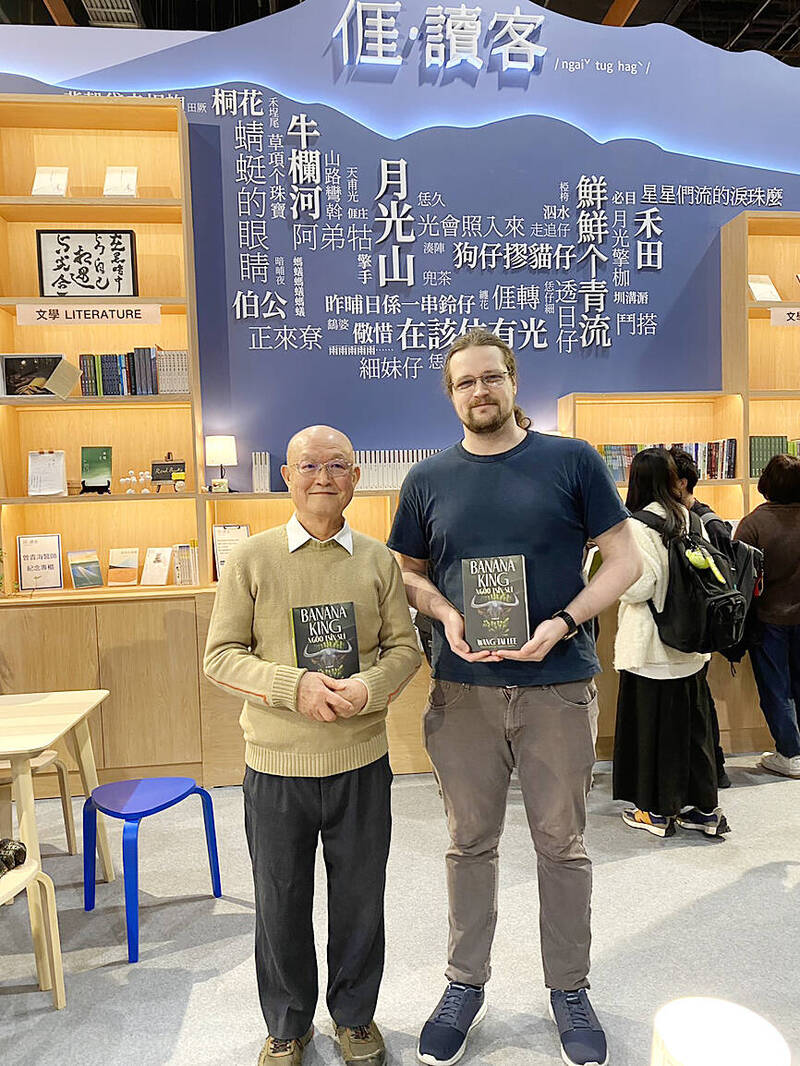《TAIPEI TIMES》 Novel nominated for awards abroad

Lee Wang-tai, left, author of Taiwanese novel Banana King Ngoo Tsin-Sui and translator Timothy Smith pose for a photograph at the Taipei International Book Exhibition on Feb. 9. Photo courtesy of the Hakka Affairs Council
By Jake Chung / Staff writer, with CNA
Taiwanese novel Banana King Ngoo Tsin-Sui (蕉王吳振瑞) by Lee Wang-tai (李旺台) has drawn the attention of international literary critics, entering consideration for two separate awards.
The novel, translated by Timothy Smith, who is also a translator for the Taipei Times, was placed as the finalist in last year’s Foreword INDIES Book of the Year Awards for the Multicultural and Historical categories, and has been longlisted for the PEN Translation Prize.
Finalists for the PEN Translation Prize are to be announced before May 8, the day of the Literary Awards Ceremony in New York.
Lee said he wanted to accurately portray Taiwan and its people in his novels, and was delighted that his works would allow foreigners to better understand the country.
“I hope Banana King would advance to the final stage and beyond, and continue to move and draw in more international readers to learn about Taiwan and its history, tragedies and triumphs,” Smith said.
The novel’s message on authoritarianism and machinations of “malicious actors” is “pertinent and timely,” providing readers with food for thought on the current social and political developments around the world, as well as how fairness, justice and social uplifting are defined, he said.
The novel’s portrayal of the protagonist and his acquaintances’ resourcefulness highlights the tenacity and perseverance of all Taiwanese, he added.
Smith said part of the challenge in translating the book was the rendition of the original work’s use of Hoklo, commonly known as Taiwanese, alongside portions in Japanese and Hakka, maintaining characters’ perspectives and voices through their own language as they would have spoken it rather than through Chinese alone.
Smith expressed discomfort at “conceal[ing] or pav[ing] over these voices by only using Chinese,” adding that these elements tied into scenes depicted in the novel’s second part of “Chinese-language teachers and their [parochial] attitudes toward multicultural Taiwanese, and Taiwanese national identity and affinity.”
The historical novel is based on the story of Ngoo Tsin-sui (吳振瑞), who created a successful banana-based business that at one point provided the majority of Japan’s banana imports, but was later accused of corruption and jailed after becoming embroiled in political disputes.
Ngoo later received a private apology from government representatives.
While approached by others who sought to right a historical wrong, Ngoo chose to let the past stay behind him, spending his last years in Japan.
新聞來源:TAIPEI TIMES






















